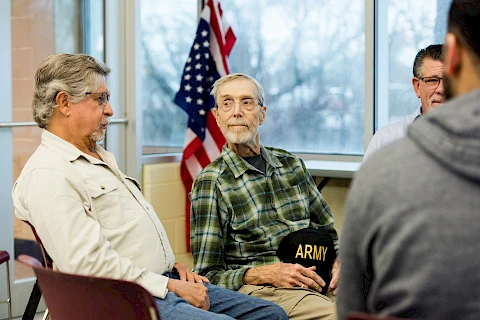
Post-traumatic stress disorder (PTSD) is a debilitating condition that affects many of our brave veterans. As they transition into their golden years, the complexities of this disorder can become more pronounced, demanding increased attention and care. There is a critical role that caregivers play in this journey, supporting senior veterans who face the challenges wrought by PTSD.
Discover practical insights and resources to aid in this crucial mission. Explore strategies to understand triggers associated with PTSD, tips for creating a safer environment, and ways to access professional support while underlining the importance of self-care.
PTSD in Senior Veterans
PTSD is a complex condition. Its symptoms can range from anxiety, restlessness, and difficulty concentrating to more serious manifestations like nightmares and flashbacks. For senior veterans, PTSD can be triggered by experiences and memories of warfare. Thus, understanding the individualities of each veteran's version of PTSD is fundamental to providing appropriate care. Patience and empathy go a long way in comprehending the particular triggers and symptoms faced by your veteran.
Creating a Safe and Supportive Environment
One of the most important aspects of caregiving for senior veterans with PTSD involves creating a safe and supportive environment. This extends beyond physical safety to include psychological and emotional security. Strategies may include maintaining a calm and peaceful home environment, staying away from triggering movies or news, and providing constant reassurance. It's also beneficial to keep a structured routine that presents a predictable pattern for the veteran. This can instill a sense of control and stability, reducing anxiety and the likelihood of PTSD episodes.
Accessing Professional Support
While being a caregiver for a senior veteran is certainly commendable, it's equally essential to recognize situations where professional help may be needed. Therapists, counselors, and medical professionals have the training and expertise to provide targeted support for PTSD. Regular medical check-ups can help monitor physical health and medication needs, while therapy can provide a safe space for veterans to process their experiences and emotions. Don't hesitate to seek professional help when it seems necessary. Remember, reaching out is not a sign of weakness but one of strength.
The Importance of Self-Care for Caregivers
As a caregiver, your well-being is crucial to the quality of care you provide. Caregiver burnout is a real risk with serious consequences. Caring for someone with PTSD can be emotionally taxing, and you want to ensure you're also taking care of yourself. Maintain your physical health with regular exercise, a balanced diet, and enough sleep. Be attentive to your emotional health, and don't shy away from seeking support when necessary, be it from a friend, a family member, or a professional counselor.
Get Guidance From Senior Helpers Costa Mesa
Caring for a senior veteran battling PTSD is a journey filled with challenges. Understanding the veteran's triggers, creating a safe environment, tapping into professional help, and prioritizing self-care are key aspects of navigating this journey successfully. Although it may be tough, remember that the support you provide is invaluable, and every step you take makes a difference.
For professional caregiving support in Orange, Santa Ana, Fountain Valley, Newport Beach, or Costa Mesa, contact us at Senior Helpers Costa Mesa. Our dedicated team is ready to provide personalized and compassionate care for your loved one, lightening your load and providing the specialized attention that senior veterans deserve. You're not alone on this journey. Let us help.